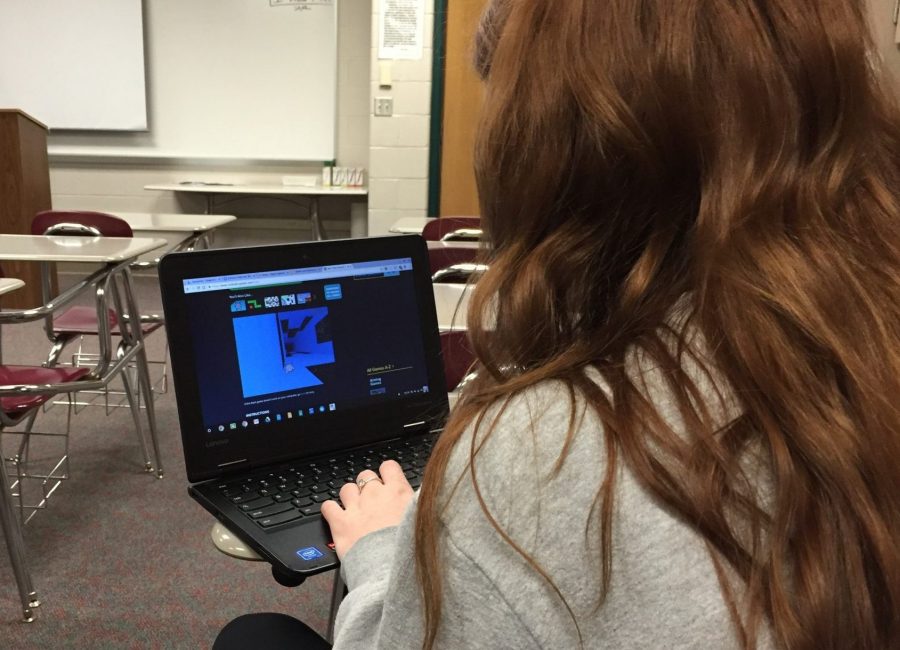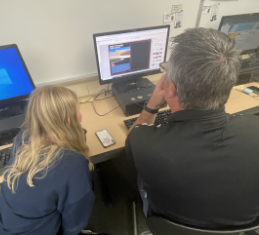On Wednesday morning a sophomore girl sits in her Seminar B. She has her headphones in listening to her Spotify playlist, as she scrolls through her Instagram feed. She knows she should be studying for her upcoming chemistry test, but instead she spends her time listening to music, staring at social media, and texting her friends.
On this particular day, October 11, the Juniors took the PSAT while everyone else had a three hour and 40 minute seminar. During this long seminar, students were given a quick assignment about their career goals to complete. Once completed, students could spend the rest of the time however they pleased. This large chunk of time is the perfect opportunity to catch up on late assignments, study for an upcoming test, or work ahead to lighten one’s workload. Unfortunately, many students did not show up for this seminar, and of the ones who did, few made the choice to use the time productively.
Frosh. Claire Miller said that everyone showed up to her seminar, but many came in late. While there was perfect attendance, she observed only five students using the time to do homework. Ten students wasted time on their phones, and the remaining students spent their time watching Netflix, listening to their music, or browsing the web and playing games on their Chromebooks.
Frosh. Trisha Pal described her seminar’s use of time in an even less productive way. Only 15 students reported to class on that day, and of this number three were late. A mere four of the 14 students were doing their homework or studying. The rest of the class not only made the choice to utilize this time unproductively, but they were also loud and disruptive, making it challenging for the students who were working.
In Soph. Elizabeth Arner’s seminar, out of the 19 people who showed up, 17 spent their work time on their phones. The two students not using their phones played games on their Chromebooks. In other words, none of the 19 students focused this time on schoolwork.
Finally, Sr. Marianna Cistaro said only ten students came to seminar that morning, and of those ten, none of them used their time to complete work.
From the collective observations of these students, it is safe to conclude the majority of students who attended seminar did not use the time efficiently. The irony: many of the students who wasted their seminar time, or skipped it all together, later complain about having too much homework. Had these students made the responsible choice and used the seminar time to their advantage, they would have found themselves with a manageable workload. While going out for breakfast with friends or sleeping in late may have been fun and easy, it took maturity to show up for seminar and do productive work. A mature student cares enough about their education to sacrifice what is fun for what will help them succeed. In college this level of maturity is necessary to succeed.
WO alumni Sean Hoey is in his freshman year at Hope College, and finding time to get everything done has been a challenge. If he was given a three or four hour seminar, he would certainly apply it toward school. “I’ve found that in college I have double, even triple, the amount of homework I had on a nightly basis in high school. I would be so thankful to get a three hour chunk of time where I could study and do homework.” Recent college graduate Naomi Kuyten concurs with Hoey. She also believes it is important for college students to have the maturity to know what is needed to stay on top of one’s schedule. “In college you have to be responsible enough to know how you need to spend your time. There won’t be a teacher constantly standing over you, telling you what to do. If you have a big test coming up, it’s up to you to decide how much you need to study for it.”
As students transition from high school to college and their careers, time management and maturity are the keys to success. Learning the value of working efficiently in high school will not just lighten one’s load, but it will also set the stage for future success.







